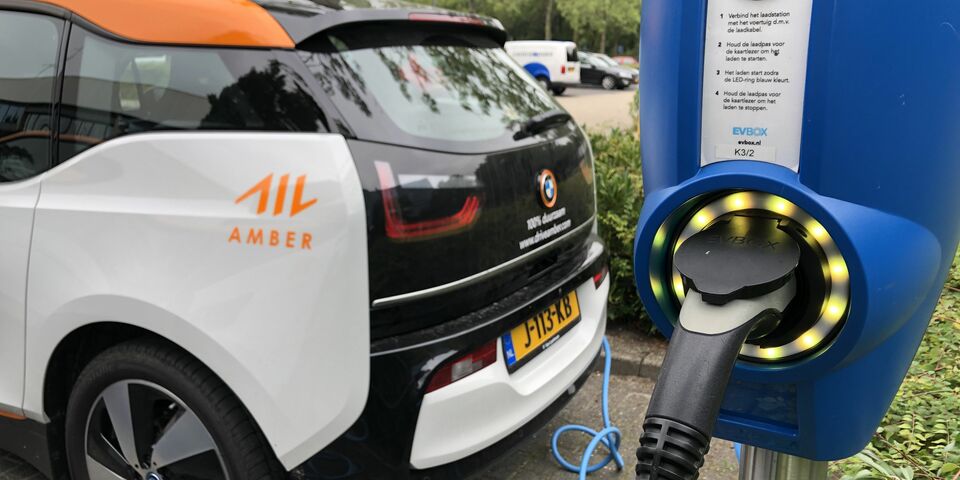Will TU/e pull the plug on its contract with Amber?
Before the end of this month, TU/e will decide whether or not it will continue with Amber for rental of electric BMW i3s on the campus. The pilot, which started in September 2018, has so far resulted in only 76 accounts of TU/e employees with Amber. 51 of them really hired a car the last two years. Much less than was anticipated. Important reasons for the low number of accounts include fear that a car might not be available, or that its range is too limited. Amber’s CEO Hans de Penning believes that the user-unfriendly system for renting a car is the true reason.
Just two weeks ago, Amber, founded in 2015 by former TU/e students Steven Nelemans and Hans de Penning, announced that the company’s shared cars would also be available to private individuals in Eindhoven. In addition, it’s also no longer necessary to return the cars to the hub where they were picked up, and each potential user has to be able to find a car within a 5-minute distance maximum. This needs to make car sharing easier than car ownership, according to the site.
At TU/e however, there wasn’t exactly a run on the eye-catching orange-white BMW i3 rental cars. They can be found on the parking lot of the Auditorium. Naturally, the outbreak of the corona crisis and the fact that the campus became practically deserted didn’t help these last six months, but in the preceding year and a half, the results were equally “disappointing, unfortunately,” says Angela Stevens, who promotes and supervises car rental in her capacity as purchaser at the Facility Management Center.
Fans
Stevens says that even though a significant number of promotional activities took place since the start of the pilot in 2018, the number of accounts created by TU/e employees at Amber remained at 76. Stevens: “51 of them are regular users, the fans of this initiative so to say. We hadn’t set clear targets at the start of this pilot, but what we’ve accomplished so far is disappointing.”
Stevens can think of two important reasons for the lack of success: “The fear that a car might not be available at the moment people need one, and that its range is too limited, so that interim charging becomes necessary. But when an employee makes a reservation for a car at Amber in time, it will always be available to him or her.” The BMW i3’s range is approximately 170 kilometers, according to Fastned after a Google search. That should be enough for short business trips, which this initiative claims to focus on.
According to Simone Vonken, policy advisor mobility, creating “a switch in the mindset” of employees proved to be difficult. “People are somewhat wary of new things and prefer to choose something they know already, and therefore they decide to go with Driessen Car rental, our other car rental agency for company cars.” Driessen’s cars include the Citroën C-Zero and the Nissan Leaf and Nissan NV200.
Oracle
Hans de Penning, CEO of Amber and former TU/e Automotive student, takes a different view however. According to him, the problem lies with the reservation system potential clients need to use, which he believes isn’t very user-friendly. “It’s a lot of work via Oracle, and I believe it’s the most important reason why this initiative never became a real success at TU/e. Half-way through, we also proposed simply to switch to the system we ourselves use for booking a rental car. That works great. Look at other educational institutions such as Fontys, HAN and Landstede for example; the pilots there were and still are very successful. The reasons for this, among other things, is that the system is user friendly and communication is excellent.”
De Penning hopes to reach an agreement with the university in the coming weeks, “after all, Amber originated here, therefore it seems to me that it is of strategic importance to both parties that Amber has a hub on the campus. We would like to keep it there, in any case, even when it isn’t contained in a contractual agreement. We still believe that Amber has potential at TU/e too. Because so far, we’ve only been talking about TU/e employees and their use of the cars, but companies and study associations on the campus make use of the BMW i3s as well. And during the last two years, including the corona period, the aformentioned 51 active account holders made almost five hundred reservations, and the cars travelled over 20,000 kilometers. That’s not too bad, but to be sure, we too had hoped for more.”
Solution
Within two weeks, TU/e will decide whether or not to continue its agreement with Amber. The current 76 account holders “surely can’t be left out in the cold,” Stevens says, “so we need to come up with a solution for that should the university decide to terminate the agreement. They could possibly join the initiative rolled out by Amber throughout Eindhoven.” The Amber hub closest to the campus is located at the EY office on the Dorgelolaan. That’s practically near the Helix building. There are ten charging stations located there.
Vonken says that the university will shortly evaluate the past two years with Amber. Vonken: “We had hoped for better results and will now determine whether Amber actually adds something to our service in this area. If that turns out not to be the case, we seriously need to ask ourselves whether we want to continue with it.”
The possible disappearance of the BMW i3s from the TU/e terrain will create more space around the charging stations TU/e currently has on the campus, Stevens says. “That’s a nice consequence for employees who travel to the campus with an electric car, and who currently have difficulty finding a spot to charge their cars during working hours.”



Discussion